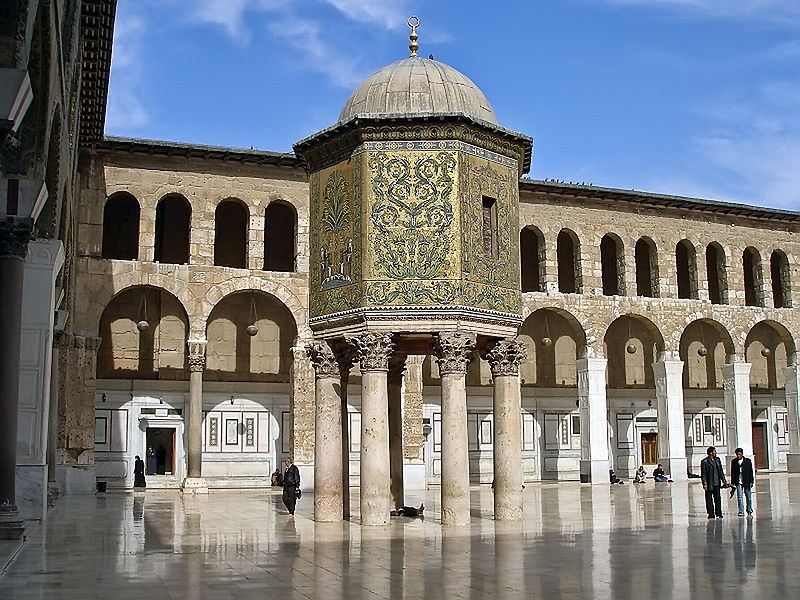 Related Articles
Related Articles
|
|
|
|
|
Is Isaiah speaking to Syria today?
A prophesy given through the prophet Isaiah almost three thousand years ago carries an ominous message for the Syria and its capital.
by Watchman
 Let me say first of all that I struggle in concerned fashion with all the ‘prophets’ who are ‘out there’; each claiming a unique insight regarding what God is doing in relation to His revealed word. Let me say first of all that I struggle in concerned fashion with all the ‘prophets’ who are ‘out there’; each claiming a unique insight regarding what God is doing in relation to His revealed word.
I have lost track of the number of times every flare-up in the Middle East is trumpeted by someone or another as being the portent of the Gog/Magog conflict in Ezekiel’s prophesy (Chs. 38 and 39), while conveniently ignoring the fact that the fulfilment of that scenario requires Israel to have been in a settled peace (in ‘a land of unwalled villages’) for a considerable period of time (Ezek 38:11).
So it is with a fair degree of reluctance that I write now on the situation in Syria (and beyond). However, as the world waits in nervous expectation to see what retribution Obama might (or might not) visit upon President Assad and his regime it is surely a moment that calls for a re-reading of a chapter of Biblical prophecy.
Grand Mosque in Damascus
 The city of Damascus is the capital of Syria. It is a large prosperous city with modern amenities and an ancient history: it is also one of the oldest inhabited cities in the world. Founded by the Aramaeans over four thousand years ago it is a living depiction of human history. Yet today Damascus is dying. The city of Damascus is the capital of Syria. It is a large prosperous city with modern amenities and an ancient history: it is also one of the oldest inhabited cities in the world. Founded by the Aramaeans over four thousand years ago it is a living depiction of human history. Yet today Damascus is dying.
Two thousand seven hundred years ago Isaiah the prophet carried God’s word to the people then. Cascading down through history these words are with us today.
An oracle concerning Damascus:
"See, Damascus will no longer be a city but will become a heap of ruins. The cities of Aroer will be deserted and left to flocks, which will lie down, with no-one to make them afraid. The fortified city will disappear from Ephraim, and royal power from Damascus; the remnant of Aram will be like the glory of the Israelites," declares the LORD Almighty (Is. 17:1-3).
 What we are seeing in the civil war which is raging in Syria is the most complex of pictures. The lines of demarcation are multitudinous and blurred. They comprise a heady and eclectic mix of tribalism, political persuasions, religious affiliations, territorial ambitions, personal agendas and international allegiances and interests. [See 'Making sense of the Syrian crisis' - Ed.] What we are seeing in the civil war which is raging in Syria is the most complex of pictures. The lines of demarcation are multitudinous and blurred. They comprise a heady and eclectic mix of tribalism, political persuasions, religious affiliations, territorial ambitions, personal agendas and international allegiances and interests. [See 'Making sense of the Syrian crisis' - Ed.]
The present regime of the Alawite President al-Assad is fighting for survival while the perennial Sunni/Shia conflict is expressed within the range of countries – Iran, Saudi Arabia, Qatar – offering support to one side or another. Amidst it all, the major players – with the U.S. and Russia foremost – are fighting to defend their national interests and their prestige in the international community, while Iran and Turkey respectively look to maintain and expand their agendas within the region.
A few verses further on we read: “Oh, the raging of many nations-- they rage like the raging sea! Oh, the uproar of the peoples-- they roar like the roaring of great waters!” (Is. 17:12).
While Damascus was counquered by Tiglath Pileser when the Assyria king invaded in 734B.C. it has never been “taken away as a city” to become “a ruinous heap”: in fact it continued as an important city of the Assyrian empire. And even if it had been destroyed Biblical prophecy can often have more than one outworking. God’s word through Amos forewarned “the people of Aram [Syria] will go into exile in Kir [Jordan] (Amos 1:5). This would have been fulfilled as part of the aforementioned invasion, but what we are seeing today is exactly the same thing happening.
 Meanwhile, Jeremiah 49:23-27 states: Meanwhile, Jeremiah 49:23-27 states:
‘Concerning Damascus: "Hamath and Arpad are dismayed, for they have heard bad news. They are disheartened, troubled like the restless sea. Damascus has become feeble, she has turned to flee and panic has gripped her; anguish and pain have seized her, pain like that of a woman in labour.
Why has the city of renown not been abandoned, the town in which I delight? Surely, her young men will fall in the streets; all her soldiers will be silenced in that day," declares the Lord Almighty. “I will set fire to the walls of Damascus; it will consume the fortresses of Ben-Hadad” [the title of several Syrian kings].’
Israel also under serious threat
Continuing in Isaiah’s prophesy we read:
"In that day the glory of Jacob will fade; the fat of his body will waste away. It will be as when a reaper gathers the standing grain and harvests the grain with his arm-- as when a man gleans heads of grain in the Valley of Rephaim. Yet some gleanings will remain, as when an olive tree is beaten, leaving two or three olives on the topmost branches, four or five on the fruitful boughs," declares the Lord, the God of Israel (Is 17:46).
So the calamity is not confined to Syria: Israel will become very lean because of their failure to remain faithful to God (cf Is. 29:13). In the present volatility, UN peace-keeping troops – there since the Yom Kippur war of 1973 – are being withdrawn from the border separating Syria and Israel. So Israel is again very vulnerable; and the more so if the Iranian-supported Hezbollah in Lebanon or the Sunni forces in Syria acquire doomsday weaponry.
While the world waits for the US decision, the BBC's Jeremy Bowen reported from Damascus
"There’s a range of possibilities. If the Americans attack, and it’s big, that could give the armed rebels an edge they have never had. A small attack would allow the regime to claim a moral victory. No attack at all would also have an impact as it would change America’s standing in the region. Whatever happens American intervention in the war here pushes it into new and unknown territory."
But in all the turmoil and conflict we learn that when people and nations are brought to the end of themselves:
“In that day men will look to their Maker and turn their eyes to the Holy One of Israel” (Is. 17:7).
Ed footnote: See article ' Peter made the connection: we must do the same' which outlines the need for everyone of God's children to have a knowledge of God's word and an ability to understand current events through the prism of Scripture.
See left-hand margin for other 'Related Articles' on the situation in Syria.
|
Watchman, 08/09/2013
|
(page
1
2
3)
| |
|
Gordon (Guest) |
09/09/2013 12:05 |
In understanding the fulfilment of prophecy we would do well to first ask ourselves some questions :
1. Is this, that which was prophesied ?
2. Because it was prophesied, does it make it a right and virtuous event ?
3. Should we necessarily participate in precipitating the event ?
With regard to the destruction of Damascus as predicted in Isaiah 17, we should note that the prophecy was precisely fulfilled during Isaiah's time when Tiglath-Pileser flattened Damascus and the surrounding strong cities, like Hazor. It is a matter of history now and no fulfilment in present day Syria is appropriate.
It never ceases to surprise me that political scoundrels will even quote Scripture to justify their compulsive behaviour.
|
| |
|
Editor |
09/09/2013 12:43 |
Gordon, History tells us that Damascus was never "flattened"; the article states: "in fact it continued as an important city of the Assyrian empire. And even if it had been destroyed Biblical prophecy can often have more than one outworking."
It is important when understanding God's prophetic word that there can be more than one fulfillment of any prophesied event. Matt ch. 24 is an example of this. As is perhaps the Amos passage which is mentioned in the article.
It is also important to realise that 'God is watching over His Word to perform it'(Jer 1:12) - ultimately irrespective of the particular circumstances; or even of our views (2 Pet. 1:20).
You are right when you say that some 'scoundrels' quote Scripture to justify their behaviour; but true believers in Jesus Christ should not be found amongst those who do.
As far as others who hold God and His Word in no esteem, they will do what they like and can often be found - even within the 'church' - distoring God's word in the process (e.g. Matt. 24:24; 2 Cor. 11:13 & 26; 2 Pet. 2:1; 1 John 4:1).
But all that doesn't nullify the Word of God nor does it detract from the sovereignty of God. The problem for modern man - indeed man through the ages - is that God does what He wants, when He wants, how He wants and through whom He wants. And He does all this without asking you or me or anyone else our opinion on it before or after the event. So whatever we (humans) believe is 'right' (in our eyes) is immaterial.
I don't know if you are a born-again believer or not (it would be helpful if perhaps you could say), but a reading of Psalm 2 puts a lot of it in perspective; especially the last three verses (Ps 2:10-12).
|
| |
|
Gordon (Guest) |
09/09/2013 20:01 |
No, I don't think Isaiah is speaking to Syria to-day , any less than he is speaking to all the nations of the world who do not accept the Gospel of Jesus Christ.
History tells us that Tiglath-Pilesar erased Damascus from the map in 732 B.C., as was predicted in Isaiah 17. The city was subsequently re-built, only to have Nebuchadnezzar repeat another destruction in later later . As time went by, Damascus once again arose from the ashes and still stands to-day.
You are right to point out that prophecies often have a double fulfilment; the first being the literal while the second is the more future spiritual application. But the prophecy is never repeated once it has been fulfilled. This also applies to the Old Covenant rituals, sacrifices and institutions.... they are all pictures of the person and work of Jesus Christ who has fulfilled all that the prophets and the Law prefigured.
However, those believers who belong to the sect of the Pharisees (Acts 15:5), who do not believe in fulfilment and cessation, will continue to walk in low visibility and get stuck in the mud and in misery.
|
| |
|
Editor |
09/09/2013 20:30 |
"Jesus Christ who has fulfilled all that the prophets and the Law prefigured."
Anyone believing that can never expect the second advent of Christ. The word of God to the church today is the same as that of Christ to the disciples on the Emmaus road. "Then He said to them, "O fools and slow of heart to believe in all that the prophets have spoken!
(Including in our day chunks of the book of Daniel; Joel ch. 3; Zech chs. 12-14).
My Bible tells me Jesus feet will on the Mount of Olives.
Hallelujah!
|
| |
|
Colin Ford (Guest) |
09/09/2013 21:34 |
Unlike the incarnation, heaven and hell, false pre tribulation rapture doctrine etc, it is very hard to be dogmatic about the prophetic Word. I agree with much of what has been said above.
Putting it another way; with hindsight, it is easy for us believers to proclaim to unbelieving Jews and Gentiles alike, Scriptures that the Lord Jesus Christ literally fulfilled. But, before their fulfillment??
Now I believe that this Syrian situation will in the short term blow away, the sabre rattling will come to an end and it will all get back to something approaching 'normal'. There will be all sorts of other issues demanding the attention of world leaders, probably, I should think the world banking crisis.
The real problem in the middle east at the present moment, I believe is Iran. But beyond that I believe in a literal rebuilding of Babylon before the end of the age....
Gordon, do you believe that the Saviour will come again, literally as Editor says?
|
| |
|
Gordon (Guest) |
09/09/2013 22:20 |
Oh yes, I believe in the second coming of Christ because, as I said, some prophecies have more than one level of fulfilment in time and nature : immediate, ongoing and final, as well as literal, figurative and spiritual. In the history of redemption, this age will come to an end when the Israel of God (Gal 6:16)is taken up to meet our Lord in the air(1Thes 4: 13-18). He is the one of whom Moses and the all the Prophets spoke (Luke 24:27), and only those who believe in his divine person and trust in his atoning work on the cross will be saved (John 3:16). His kingdom is not of this world, so we can do without immersing ourselves in the daily newspapers and 24 hour BBC news reports to understand the Scriptures.
|
| |
|
Editor |
09/09/2013 22:44 |
Good to know that you believe that there are some prophesies that remain to be fulfilled. I take it from your comments that you are of Dispensationalist belief (forgive me if I am wrong) which generally doesn't believe that OT prophecy has anything to say to our present age i.e. prophecy being of an earlier 'dispensation'.
Regarding your comment "we can do without immersing ourselves in the daily newspapers and 24 hour BBC news reports to understand the Scriptures"
I would suggest you have it the wrong way around. The Scriptures are our guide to understanding the daily news. And for the Christian to divorce him/herself from the world around us is absolute folly. It is the pious attitude which Jesus condemned in the Pharisees. It is also a form of modern-day 'other-wordly' monasticism.
With respect to your comment about Damascus being destroyed, the UNESCO World Heritage site describes it as being "the oldest city as well as the oldest capital of the world. It is the cradle of historical civilizations, constituting a beacon of science and art over time, and a historical encyclopaedia which tells a great part of the history of humanity. In the same way, it represents a historical reference for comparing the systems of architecture and town planning over several thousand years." Although subjugated it was never destroyed.
The Encyclopedia Britannica states: "“Many scholars believe that, among the ancient cities of the world, Damascus is perhaps the oldest continuously inhabited."
|
| |
|
Gordon (Guest) |
10/09/2013 11:13 |
The good news this morning is that there wont be any added destruction of Damascus by USA bombs. This confirms that Isaiah 17 was not intended to apply to the current civil war situation in Syria. Political scoundrels will resort to any straw to back their aggression, and even the Devil quoted Scripture about the kingdoms of this world when he sought to divert Jesus from His mission.
Some Christians spend too much time on reading their 'hawkish' and worldly newspapers, listening to the biased BBC radio and TV, or fiddling on the Internet, than they do on meditating on God's revelation in Jesus Christ. False values penetrate the mind and leave the reader depressed, confused and indecisive. We risk becoming so earthly minded that we are of no heavenly use.
For those who are inclined to deal with the Bible and the daily newspapers on an even handed basis, a la Rowan Williams, a little bit of 'day and night' monasticism might not be such a bad thing as you make it out to be (Ps 1:1-2).
|
| |
|
Jack Thomson (Guest) |
10/09/2013 11:58 |
Rowan Williams????????????
Would that be the pagan with sombre,sonorous,soporific tones which he used to convey an altogether synthetic spirituality - and who was once the head of the second largest apostate church in the world - and who could never quite make his mind up on anything.......
This is the fellow who you are holding up to be an example to true believers in respect of prioritising God's word over the opinions of men?
Thanks....but No Thanks
|
| |
|
Colin Ford (Guest) |
10/09/2013 12:23 |
jack, certainly I agree with you regarding Mr Williams and the Church of England. But even druids can come up with good advice? Exodus 18.24 KJV. Jethro, Moses father in law was a pagan priest.
The mainstream media, as you know, cannot be relied upon for unbiased, or reliable reporting. Certainly NOT the BBC (Biased Broadcasting Corporation)!
|
(page
1
2
3)
|
|
|